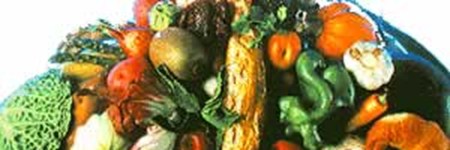Tiredness diet
DEFINITION
The aim of the diet for Tiredness is to ensure an adequate
supply of nutrients and fluid is available at all times, to assist
in weight loss if overweight and to minimise the intake of “empty
calorie” foods which rob the body of vital vitamins.
supply of nutrients and fluid is available at all times, to assist
in weight loss if overweight and to minimise the intake of “empty
calorie” foods which rob the body of vital vitamins.
DIET SHOULD BE ADEQUATE IN
- PROTEIN: small serves of lean protein foods should be included
at each meal. - COMPLEX CARBOHYDRATES: bread, cereal and starchy foods provide
a gradual and prolonged maintenance of adequate blood sugar. They
should be eaten at each meal and for between meal snacks. - FLUID: Drink 6 to 8 glasses of water daily.
- IRON: defiency is a common cause of anaemia, resulting in
tiredness and lethargy. Sources include oysters, liver, soybeans,
wheatgerm and sunflower seeds. - ZINC and the B group vitamins. Good sources are liver, lean red
meats, oysters, yeast extracts, egg yolks, wholemeal bread and
cereals, raw wheatgerm and nuts. - Vitamin C rich foods improve your intake of iron. Sources
include citrus fruits, capsicum, broccoli and potatoes.
DIET SHOULD BE LOW IN
- Refined, processed foods, sugary foods and sweetened soft
drinks. These raise the blood sugar level and provide an initial
burst of energy, but then cause a drop in blood sugar (rebound
hypoglycaemia), leading to fatigue. - Fatty and fried foods. High-fat foods are slow to digest and
give a feeling of fullness without providing adequate nutrients for
energy. - Alcohol and caffeine. Drinks such as tea, coffee and alcohol
interfere with normal sleep patterns and increase tiredness.
SAMPLE MEAL PLAN
The following diet has been suggested for this
condition.
condition.
BREAKFAST
- Two glasses of water on rising.
- Small tin of baked beans or sardines on two slices of wholemeal
toast, or one egg, boiled or scrambled with fresh tomato on two
slices wholemeal toast, or one cup rolled oats porridge with
milk. - One piece fresh fruit – orange, kiwi fruit, melon, pawpaw,
mango or strawberries.
MORNING TEA
- One slice wholemeal raisin toast with jam.
- Tea or “weak” decaffeinated coffee.
- One or two glasses of water.
LUNCH
- Two slices wholemeal or multigrain bread or one bread
roll. - One slice lean ham, silverside, roast meat, or 1/4 cup chopped
chicken, or half a cup cottage cheese, or one egg or 1/4 cup
salmon, tuna. - Plenty of salad vegetables including fresh tomato.
- One piece of fresh fruit.
AFTERNOON TEA
- Small tub diet non-fat yoghurt or two to three crispbreads with
smoked oysters or sardines. - Tea or “weak” decaffeinated coffee.
DINNER
- 90-120g lean beef, lamb, pork, veal, mince, skinless chicken or
vegetarian meat substitute, or 180-240g grilled or tinned fish, or
two to three soybean rissoles, or two egg omelette with 20g grated
cheese. - One medium jacket potato, or half a cup mashed potato, or half
a cup steamed rice, wholemeal pasta. - Half a cup carrot, pumpkin or corn.
- Half to one cup green vegetables such as broccoli, beans,
silverbeet, peas, zucchini or salad. - Two glasses of water.
SUPPER
- One piece fresh fruit, or half cup fruit salad plus diet
jelly. - Tea or “weak” decaffeinated coffee.
REMEMBER
- Eat small frequent meals.
- Include small serves of protein foods at each meal.
- Drink plenty of water.
- Exercise regularly to assist weight control and improve your
energy levels.
NOTES
Small, frequent meals and snacks are suggested. Regular
exercise, such as walking 1/2 to 3/4 hours daily helps weight loss
and improves energy levels. Tea is best consumed BETWEEN
meals.
exercise, such as walking 1/2 to 3/4 hours daily helps weight loss
and improves energy levels. Tea is best consumed BETWEEN
meals.

